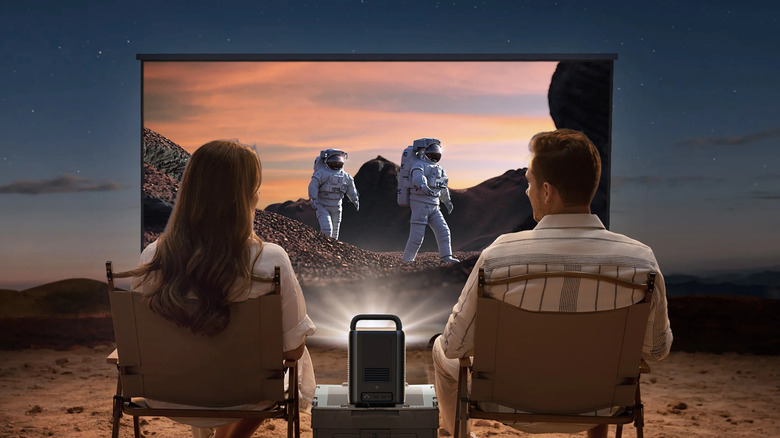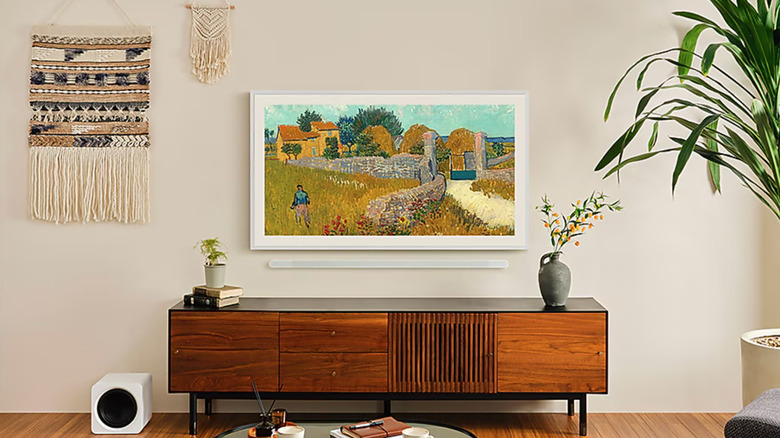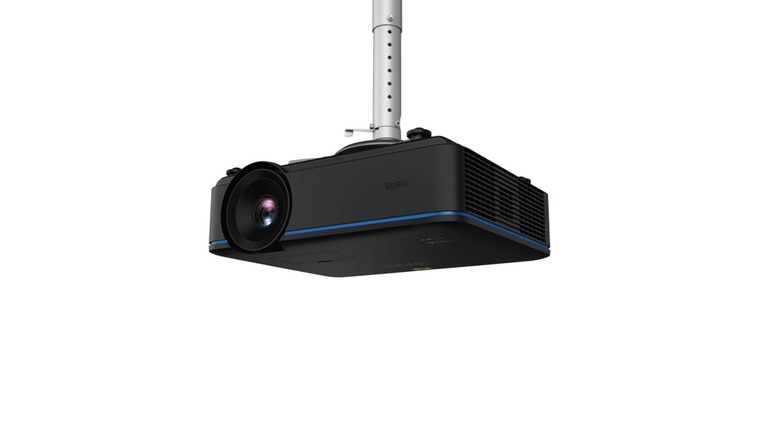Can A Smart Projector Replace Your TV? What To Consider Before You Buy
We may receive a commission on purchases made from links.
In recent times, there has been a rise of next-generation television sets, as well as smart projectors. An increasing number of high-end projectors are offering options like higher quality displays, streaming, and smart home integration that make them compelling alternatives. With features starting to blur, many people are seriously thinking of swapping out their TVs for modern projectors, whether it's for personal or commercial use.
If you're currently in the market for a new TV, you may be asking yourself if a projector is actually a better fit for your needs. While there's honestly no perfect answer, especially since there are a range of practical applications where either solution could work, there are some key differences in how they're set up, used, and maintained that can swing you towards either direction. For example, the display needs of an office or an entertainment facility are completely different from the needs of a single person or a family of four looking to upgrade their home. So, before we begin, ask yourself if the primary reason you're getting a projector or TV is for visual display, such as presentations, or multimedia, such as games or movies. Once your objective is clear, here are some features to weigh before you make a commitment.
Set up requirements
In general, television sets are designed to stay in one area of your home or office. Because of this, the placement is a little more permanent than projectors, which can easily be moved around and can easily join your adventures. To get the best view on both display options, it's pretty common knowledge that the cinema house format of a dark environment helps increase the contrast. But between the two, television screens are definitely less sensitive when it comes to picture quality. In addition, there are even TV models that are made to be used in more complex environments, like outdoor TVs.
Because projectors don't always come with their own screen, there is an extra variable that you need to control when it comes to the output: the display surface. Projectors can work on any flat surface if you're not very picky, even your ceiling. But if you want to optimize your viewing experience, you'll want to get a proper projector screen. However, this also means you need to think about the additional cost of ownership for the screen, including how to store it. Previously, we've actually also discussed whether you should build and buy projector screens, which boils down to budget and access to materials like tools and specialty fabric. Depending on your projector, you may also want to factor in the cost of a new console or mounting it on the ceiling or wall.
Difference in picture quality
In the past, there was definitely a period wherein projectors fell behind in terms of picture quality. But these days, there are plenty of expensive projectors that can definitely rival some high-end television screens in terms of quality. Previously, we've already discussed how the latest projector technology has made it possible to reach higher resolutions, sharper images, better colors, and improved contrasts. In fact, we've even rounded up some of the best Ultra Short Throw (UST) projectors, which give the same energy as 4K television sets. There has also been a rise in gaming projectors, like the Hisense Laser Cinema PX3-Pro, which are specifically designed for use with the Xbox console, wherein you can already enjoy many gaming TV features like high refresh rates, low latency, and HDMI-compatible panels with a projector. However, it's important to note that this particular model doesn't come cheap at $3,499.99. In addition, there are a lot of TVs larger than 55 inches that are good enough for the average gamer and are half the price.
If you plan to stream content on your display using services like Netflix or Hulu, you should also take note of High-bandwidth Digital Content Protection (HDCP) features. If not, you might find yourself unable to display videos from copyrighted content. But of course, if you value portability more than picture quality and only need it to display PowerPoint presentations, there are tons of portable projectors that might already be good enough for your needs.
Aesthetic value
Between the two, there are definitely "prettier" television options in the market, such as the Samsung The Frame TV. Not only are their screens designed to display artwork, but they also come with official frame options. With this, you can easily match it to the aesthetics of your home, as well as make it function as a decorative piece on an ordinary day. But to be honest, a large majority of television screens do just look like ordinary black boxes, which can be low-key eyesores in general.
On the other hand, you'll need to consider the appearance of an added console or cabinet when thinking about projector placement. To get to a certain size, your projector must be placed at an optimal distance. But, if you don't like how it looks, it's also pretty easy to shove it into a cabinet when it's not being used. With this, you can enjoy the benefits of a display when you need it and have a timeless and gadget-free living room or workspace when you don't. In addition, projectors can be used for other practical display options, especially because they can be moved to display on larger or smaller surfaces. For example, there are numerous videos on YouTube that can be projected on walls, creating the illusion of looking out a window or exploring different worlds, or even displaying artwork.
Sound quality
For home theater enthusiasts, you might be on the fence about projectors due to the old-school way of thinking that they have horrible speakers. In fact, many old projectors didn't have speakers at all. In some cases, some powerful, modern projectors like the Epson Home Cinema 5050UB 4K PRO-UHD®1 3-Chip HDR2 Projector still don't come with speakers, because it's expected that it will be working with an external audio system upon installation. However, a growing number of renowned speaker brands are partnering with projector manufacturers to produce projector options with reasonably good sound.
These days, there are now gems like the Anker-powered Nebula Cosmos Laser 4K Projector that sells for just under $2,000 and features Dolby Audio, with dual 10W subwoofers and 5W tweeters. Alternatively, you want to go a little bit cheaper with a more popular audio brand, the XGIMI Horizon Ultra retails for $1,699.99. Not only do you get 4K with Dolby Vision, but you also get to experience dual 12W Harman Kardon Speakers with the Horizon Ultra. That said, if you're picky about audio anyway and still want to get a separate sound system, this may not matter to you so much. With so many soundbar brands in the market, you're bound to find one that fits your setup. For people on a budget, there is no shortage of high-quality soundbars under $200, like the Sonos Ray, Amazon Fire TV Soundbar, and Sony HTS100F.
Maintenance requirements
While we are on the road to getting self-repairing electronics, it's good not to hold our breaths, especially since it's not very profitable for companies to make their stuff last forever. Depending on your projector model, the recommended length of usage before a bulb replacement will vary. Although you'll be relieved to know that expensive projector models do tend to have improved heat management capabilities, which contributes to a relatively longer working period before a bulb replacement is necessary. So, while they may have higher ticket prices compared to older models, it does make up for it with their extended lifespan. However, even the longest-lasting laser-based projectors, like the Benq LK953ST, which are known to be used on everything from high-definition artwork to golf simulators, can only do up to 20,000 hours. In comparison, Reliant shares that 4K QLED TVs are known to last more than triple that at 70,000 hours. Additionally, if you're not picky with 4K quality, it even mentions that OLED TVs can go up to 100,000 hours. That said, similar to projectors, television screens also need to be cleaned and benefit from surge protection devices.
At the end of the day, there are pros and cons for each device, so understanding your lifestyle or the needs of your workplace and knowing what kind of display you frequently use matters. But if budget allows, there's also the option that you get both, as their uses can complement each other.





